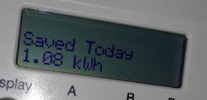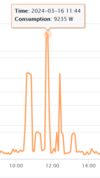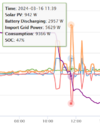- Joined
- 27 Jan 2008
- Messages
- 23,671
- Reaction score
- 2,668
- Location
- Llanfair Caereinion, Nr Welshpool
- Country

As yet not getting paid for export, so clearly electric is the cheapest, once set up I will get 15p per kWh for exported electric, and if I use electric over night it will cost me 8.95p per kWh so really no point in having the iboost+. However last year I see it showed around just over a kWh per day to keep water warm
 which seems a lot less than expected, as boiler would run for around 20 minutes 4 times a week, and it is around 20 kW. This points to some massive losses in the pipe work, however the immersion does not heat up as much as the boiler, but don't really need much only used to wash our hands.
which seems a lot less than expected, as boiler would run for around 20 minutes 4 times a week, and it is around 20 kW. This points to some massive losses in the pipe work, however the immersion does not heat up as much as the boiler, but don't really need much only used to wash our hands.
I hear it said that electric costs 5 times what gas costs, and I know we pay less for oil than we did for gas, but it seems using around 80 minutes at 20 kW a week with oil, and 8 kWh with electric, so the numbers don't seem to add up.
I can't see how much electric is being used until we stop using central heating. The picture was from last year, but it seems electric may be cheaper than using the central heating boiler, has anyone actually measured the two? Or is it just an assumption that electric costs more than gas so it must be cheaper to heat DHW by gas?
It seems gas cost around 7.5p per kWh and oil around 8.7p per kWh so it seems not 5 times as expensive anyway.
 which seems a lot less than expected, as boiler would run for around 20 minutes 4 times a week, and it is around 20 kW. This points to some massive losses in the pipe work, however the immersion does not heat up as much as the boiler, but don't really need much only used to wash our hands.
which seems a lot less than expected, as boiler would run for around 20 minutes 4 times a week, and it is around 20 kW. This points to some massive losses in the pipe work, however the immersion does not heat up as much as the boiler, but don't really need much only used to wash our hands.I hear it said that electric costs 5 times what gas costs, and I know we pay less for oil than we did for gas, but it seems using around 80 minutes at 20 kW a week with oil, and 8 kWh with electric, so the numbers don't seem to add up.
I can't see how much electric is being used until we stop using central heating. The picture was from last year, but it seems electric may be cheaper than using the central heating boiler, has anyone actually measured the two? Or is it just an assumption that electric costs more than gas so it must be cheaper to heat DHW by gas?
It seems gas cost around 7.5p per kWh and oil around 8.7p per kWh so it seems not 5 times as expensive anyway.




